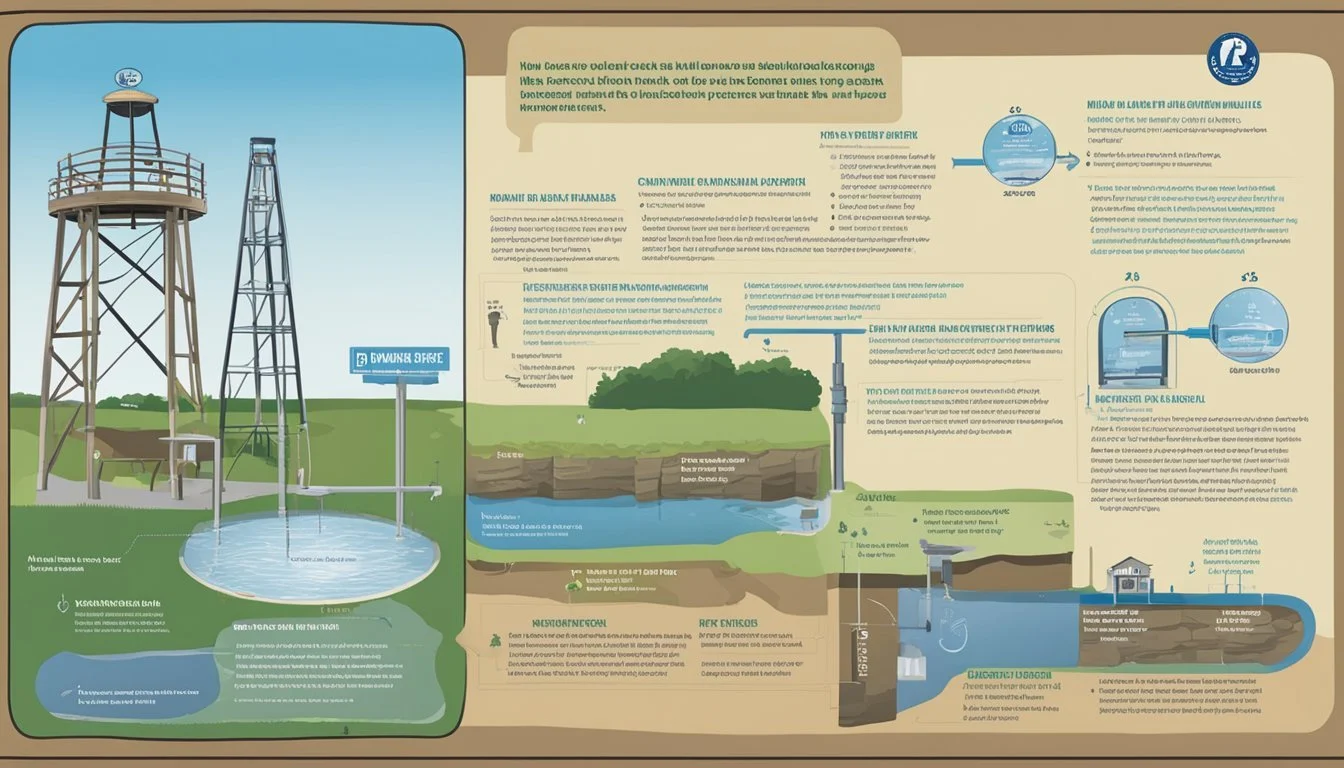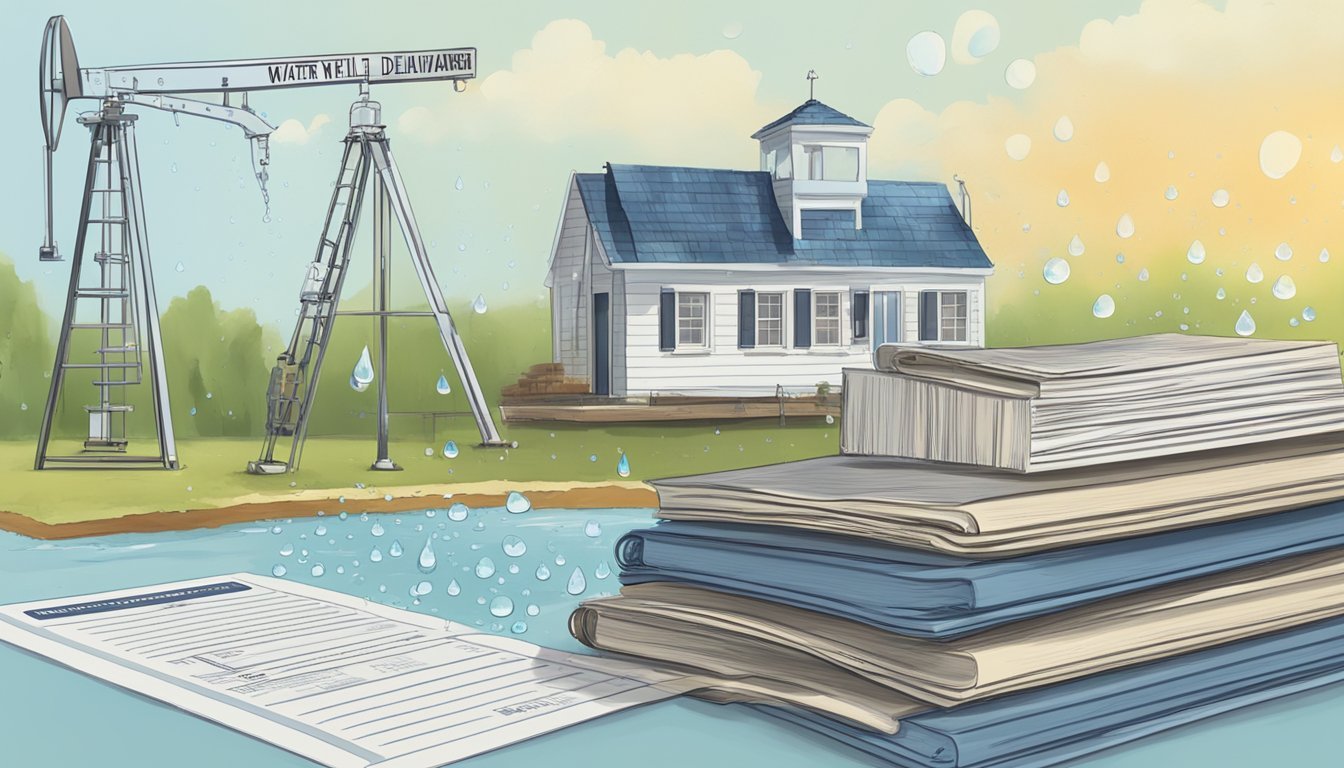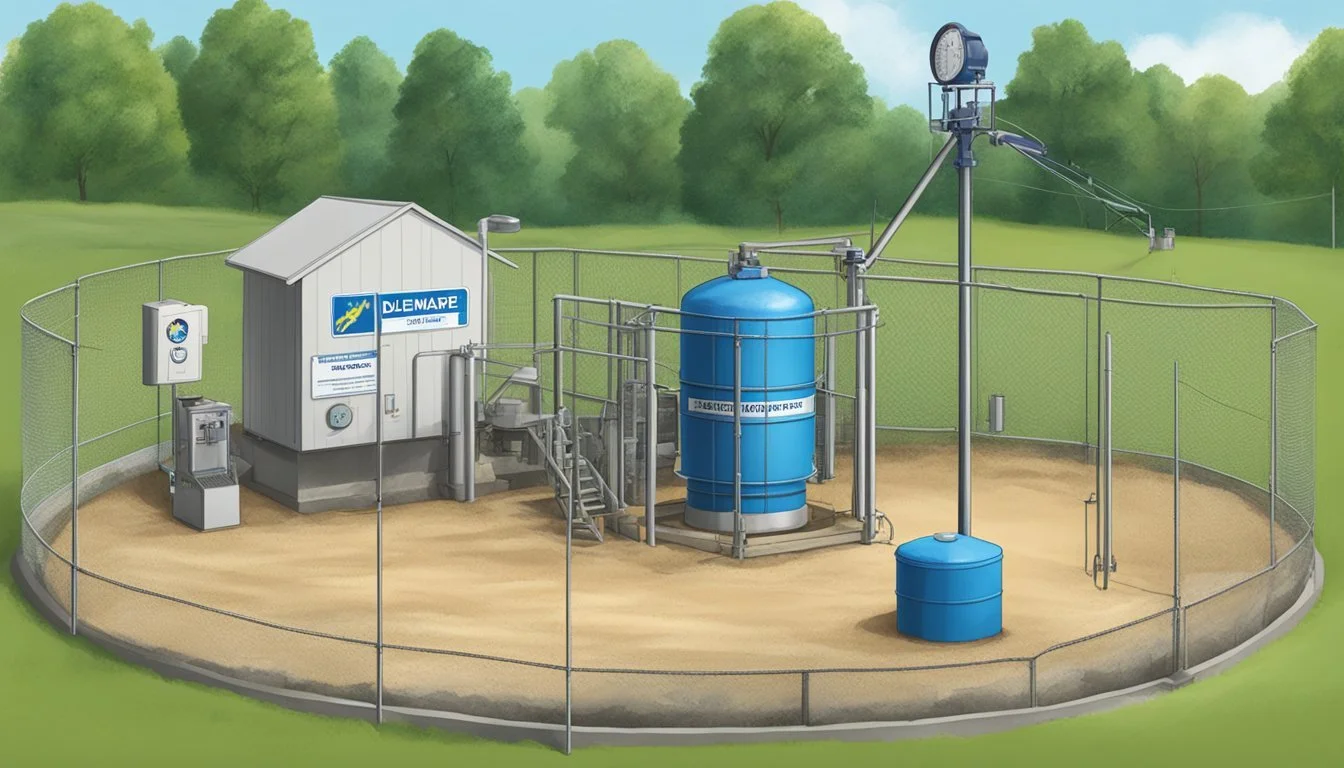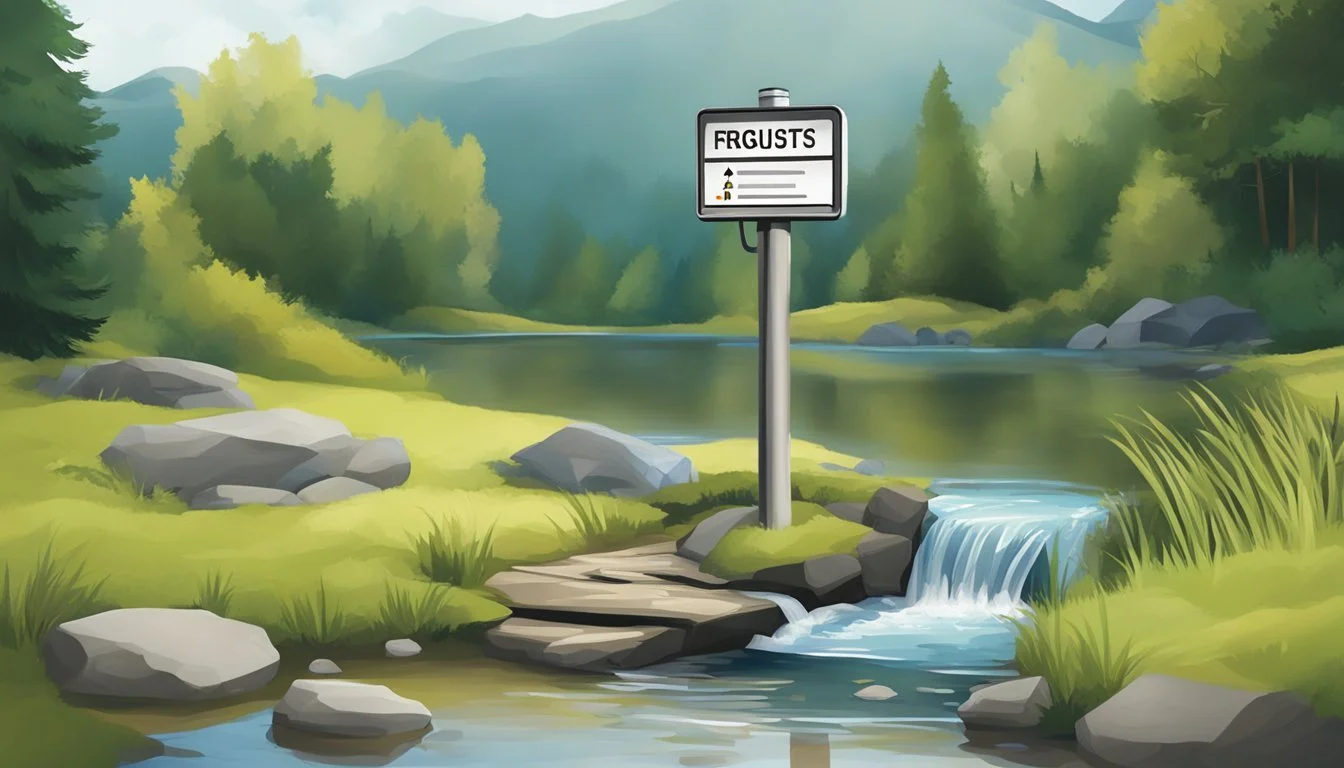Delaware Water Well Regulations
A Guide to Compliance and Safety
Delaware recognizes the vital importance of managing its groundwater resources efficiently and safely. To this end, the state has established a comprehensive set of regulations concerning the construction and use of water wells. The Department of Natural Resources and Environmental Control (DNREC) plays a crucial role in administering these regulations, ensuring that all Wells meet the safety and quality standards, protecting both the environment and the health of residents.
These regulations are not just guidelines but enforceable rules under the authority granted by specific sections of the Delaware Code. They encompass a range of stipulations, from the required licensing of water well contractors to the adherence to construction standards that prevent contamination. Permitting is a key component, with Applications for well construction and well use permits mandatory, handled through a licensed water well contractor. The criteria for licensing and the processes involved are shaped by the Water Well Licensing Board, highlighting Delaware's commitment to professionalism in the well drilling industry.
The maintenance of these standards is underscored by continuing education requirements for professionals in the sector. Licenses for well drillers and related trades are subject to annual renewal, contingent upon proof of such
This rigorous framework ensures that Delaware's groundwater resources are tapped responsibly, with due consideration given to sustainable use and the minimization of environmental impact.
Regulatory Framework
Delaware maintains a robust legal structure to ensure the responsible construction and use of water wells. This framework is designed to protect public health and conserve water resources.
Department of Natural Resources and Environmental Control Roles
The Delaware Department of Natural Resources and Environmental Control (DNREC) is pivotal in administering and enforcing the state's water well regulations. They implement policies that govern the construction and use of wells, encompassing design, installation, modification, and repair. It ensures that all processes align with public safety and sustainability goals.
Legislative Scope and Applicability
Delaware's legislative framework for water well construction and maintenance applies to all individuals and entities within the state's borders. It dictates stringent guidelines that must be followed regarding location, design, and the licensing of water well contractors. Contractors involved in drilling, boring, constriction, and installation of wells are obligated to adhere to these directives to prevent contamination and depletion of water resources.
Statutory Authority and Jurisdiction
Statutory authority is enshrined in laws that grant the DNREC and the Water Well Licensing Board the jurisdiction to issue licenses and regulate water well standards state-wide. The Board also handles the oversight of professionals in the well drilling industry, ensuring adherence to the regulations established for water resource management and protection. They have the power to sanction entities that deviate from the prescribed legal norms, thereby upholding Delaware's water management laws.
Licensing Requirements
In Delaware, stringent requirements are in place for licensing individuals and companies involved in water well construction and maintenance to ensure public health and water resource protection.
Well Driller and Pump Installer Qualifications
To qualify as a Licensed Well Driller or Pump Installer in Delaware, individuals must display competence through examination and practical experience. According to the state's regulations, applicants are required to pass a written test that covers relevant topics such as geology, hydrology, and technical drilling methods.
Water Well Contractor Licensing
A Water Well Contractor must obtain a valid license issued by the Delaware Department of Natural Resources and Environmental Control (DNREC). The licensing process involves demonstrating knowledge of the construction and use of wells by meeting criteria outlined in the state's Water Well Contractor Licensing Program. This program sets forth rules for both the technical and business aspects of well contracting.
Renewal and Continuing Education
Renewal of licenses for well drillers and pump installers necessitates participation in Approved Continuing Education programs. Delaware mandates that licensed professionals must complete specified hours of continuing education to stay updated with advances in technology and changes in regulations. The Renewal process ensures that licensed practitioners maintain a high standard of competency in their field.
Well Construction and Installation Standards
In Delaware, stringent regulations are set for well construction and installation to ensure public safety and environmental protection. These protocols address construction specifications, use of appropriate materials and equipment, as well as detailed requirements for well casing and cementing.
Construction Specifications
All wells in Delaware must be built to specific dimensions and distances from contamination sources, in accordance with the Regulations Governing the Construction and Use of Wells. Construction details also include the placement of wells to maximize separation distance, which is essential for preventing contamination.
Siting Criteria: All wells are required to be placed at a maximum feasible separation from potential contaminants, never less than the minimum distances prescribed by law.
Design Requirements: Ensures each well is designed considering factors like local hydrogeology and land use.
Materials and Equipment
Only state-approved materials and equipment can be used in the construction of wells within Delaware. This guarantees that all components meet health and safety standards.
Approved Materials: The use of nontoxic and corrosion-resistant materials is mandated for all aspects of the well construction.
Equipment Quality: Equipment used in well construction must be durable and capable of achieving and maintaining the intended performance standards.
Well Casing and Cementing
Well casing and cementing are critical for maintaining the integrity of the well and preventing groundwater contamination.
Well Casing: Must be of sufficient strength and durability. The Well Construction Standards specify the types and placing of casings.
Cementing: The process must create an impervious barrier to prevent migration of water and contaminants. The mixture should be made with specific proportions of water and cement to create a solid seal.
The application of these precise standards in construction practices ensures that well integrity and water quality are not compromised.
Water Supply Protection
Protecting Delaware's water supply requires stringent regulations and measures to prevent contamination and ensure public health. This involves comprehensive monitoring and quality assurance practices, as well as the establishment of clear separation distances and protection zones around water supply systems.
Contaminant Prevention Measures
Contaminant prevention measures are crucial for sustaining a safe potable water supply in Delaware. These regulations mandate that all wells, including those near septic tanks and cesspools, adhere to strict location and construction standards. For instance, it is imperative that water supply lines are placed at sufficient distances from potential contamination sources. The 7301 Regulations Governing the Construction and Use of Wells prescribe minimum requirements for protecting both public and private potable water supply wells.
Monitoring and Quality Assurance
Regular monitoring of water supply systems is vital for quality assurance and maintaining public health. Delaware's Division of Water enforces protocols for the periodic assessment of water quality to detect any potential contaminants. The state has implemented the Delaware Wellhead Protection Plan, which delineates protective measures and establishes procedures for monitoring, to ensure that public water supply wells remain free of pollutants.
Separation Distances and Protection Zones
Separation distances and protection zones are established to safeguard water supply from various sources of contamination. Specific guidelines define the minimal separation distance between water supply wells and potential contaminants like underground storage tanks. In addition, protection zones are designed to encapsulate critical areas around water supply wells, forming a barrier against the encroachment of contaminants. These mitigation strategies are integral to Delaware's approach to Source Water Assessment and Protection, emphasizing the importance of preventive measures in water safety and public health.
Permitting and Documentation
In Delaware, the process for well permitting and associated documentation is comprehensive, involving precise steps for application, meticulous record-keeping, and clear property documentation requirements.
Well Permit Application Process
The process begins when an individual or entity submits a Well Permit Application. Applicants provide their name and address, along with the application fee, to the Delaware Department of Natural Resources and Environmental Control (DNREC). They must specify details about the location and purpose of the proposed well. Upon approval, a unique Well Permit Number is issued.
Required Information:
Applicant's Name and Address
Specific details about intended well use
Exact location, often including the Parcel Number
Associated Application Fee
Record Keeping and Reporting
Once a permit is granted, the permit holder is responsible for maintaining accurate records. These records include documentation of the well's construction, modifications, and if applicable, its eventual sealing. Homeowners and contractors need to report any changes to the DNREC and manage details pertaining to all Existing Wells on the Property.
Documents to Keep:
Construction details
Maintenance logs
Modification records
Property and Ownership Documentation
Clear delineation of property ownership is paramount. Prospective well owners must provide documentation establishing their right to construct a well on the property in question. This entails providing a Parcel Number and proof of ownership. For multiple Properties or large parcels, exact locations for each well must be delineated.
Ownership Proofs Include:
Deed or title documents
Official property surveys showing the precise well location
Operations and Maintenance
The integrity and functionality of water wells in Delaware are crucial for ensuring safe and reliable water supplies. The state's regulations stipulate specific methods and standards for maintaining these systems. Proper operations and maintenance are essential components of the regulatory framework, utilizing methods that assure clean, potable water through the engagement of qualified professionals.
Routine Well Maintenance and Cleaning
Regular maintenance and cleaning are essential for preventing contamination and extending the lifespan of a water well. Maintenance standards specify that well systems, including pumps, meters, and valves, should be routinely inspected by licensed well drillers to ensure they function correctly and efficiently. Notably, Regulations Governing the Construction and Use of Wells provide guidance on these inspections, ensuring that wells are free of obstructions and contaminants that might affect water quality and safety.
Repair, Alteration, and Decommissioning
Repairs or alterations to water wells must only be conducted by licensed professionals, such as well drillers and well drivers, to guarantee that the structural and operational integrity of the well is not compromised. The Regulations for Licensing Water Well Contractors aim to protect public health by outlining precise procedures and requirements. When a well is no longer in use, it must be properly decommissioned to prevent it from becoming a conduit for contaminants.
Safety and Emergency Protocols
Ensuring safety during well operation and in emergencies is paramount. Safety protocols must be followed rigorously by all individuals involved in the well's maintenance and operation. Licensed contractors are instructed to follow emergency procedures to mitigate hazards swiftly. The Water Well Licenses issued by DNREC emphasize the necessity of quick response measures and the proper installation and maintenance of safety equipment to protect against unforeseen incidents.
Enforcement and Compliance
Delaware upholds stringent regulations in the management of water wells to safeguard public health and its water resources. Strict enforcement ensures adherence, while defined procedures outline the course of action for compliance breaches.
Regulatory Oversight and Inspections
The Delaware Department of Natural Resources and Environmental Control (DNREC) oversees the implementation of well construction and usage standards. They conduct regular inspections to ensure compliance with the 7301 Regulations Governing the Construction and Use of Wells. Inspectors assess the location, design, installation, use, and maintenance of wells to verify that all activities adhere to the prescribed requirements.
Penalties and Violations
In instances of non-compliance, the Secretary of DNREC is authorized to issue penalties. These can range from fines to more severe sanctions for repeated or egregious violations. Penalties and enforcement actions are structured to deter future infractions and to rectify any harm caused to the state's water resources.
Dispute Resolution and Appeals Process
Should there be a contestation of alleged violations or penalties, an established appeals process offers a route for resolution. Parties can present their case before an administrative hearing panel as outlined by DNREC. This transparent process ensures fair examination and deliberation over the enforcement actions taken.
Frequently Asked Questions
Delaware's regulations on water wells set strict standards to ensure safety and sustainability. The following information answers common queries regarding well drilling within the state.
What are the minimum property line setback requirements for drilling a well in Delaware?
In Delaware, wells must be strategically placed to prevent contamination; the minimum setback requirements from property lines ensure that drinking water remains safe.
How deep must a water well be to meet Delaware regulations?
The required depth of a water well varies based on geological and hydrological conditions. However, all wells must be drilled to a depth that meets both the safety and the functional requirements as defined by Delaware authorities.
What permits are needed for well drilling in Delaware?
Before drilling a well, it is mandatory to obtain a well permit. This permit process includes a contamination review to ensure the proposed location is safe from potential contaminants.
What are the water quality testing requirements for a new well in Delaware?
After a new well is drilled, water quality testing is required to detect any harmful substances. The state mandates that the water meets certain quality standards for safe consumption.
Who is authorized to drill water wells in Delaware?
Only licensed professionals are authorized to drill water wells in Delaware. The Water Well Licensing Board oversees the certification of contractors in the well drilling field.
Are there specific construction standards for water wells in Delaware?
Yes, Delaware has specific construction standards for water wells to ensure the integrity of the well structure and prevent contamination of the water supply.








